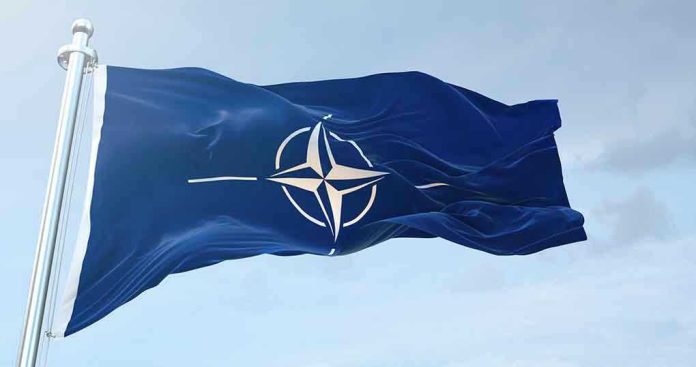
One leader’s unpredictability has shattered the world’s diplomatic compass, and the global order may never recover its sense of direction.
Story Snapshot
- Trump’s second-term foreign policy has veered into new, destabilizing territory, blending impulsive moves with rare diplomatic wins.
- Traditional U.S. alliances are fraying as unpredictability and abrupt reversals leave allies doubting American reliability.
- Short-term breakthroughs, like the Israel-Hamas cease-fire, exist alongside escalating crises, trade wars, and military brinkmanship.
- Experts warn the erosion of multilateral institutions and trust could have permanent consequences for global security and the U.S. role in the world.
Trump’s Foreign Policy: An Unstable Cocktail of Breakthroughs and Blowups
Donald Trump’s second term began with a familiar pledge: “America First.” The world braced, but few could have predicted the speed and scale of the disruption. Within months, Trump had brokered a fragile cease-fire between Israel and Hamas—hostages released, headlines trumpeting his “deal-maker” prowess. Days later, a trade war with Canada erupted over a minor diplomatic slight, followed by U.S. military strikes in Venezuela that sent shockwaves through Latin America. For every diplomatic win, chaos lurked just around the corner.
Allies and adversaries alike struggled to keep up. NATO partners, pressured publicly and privately, reluctantly increased defense spending, yet their trust in U.S. commitments plummeted. European leaders murmured about “strategic autonomy,” openly contemplating life without a reliable American security umbrella. Meanwhile, adversaries like Russia and China seized opportunities, testing the limits of a distracted, unpredictable superpower.
How Trump’s Style Reshaped Global Relationships
Trump’s approach has always been intensely personal and transactional. Multilateral institutions—the bedrock of U.S. postwar strategy—were sidelined in favor of direct leader-to-leader deals. The State Department, Pentagon, and traditional diplomatic channels found themselves outflanked and outmoded as decisions emerged from midnight phone calls and Twitter pronouncements. Allies who once trusted in steady American leadership now hedge their bets, seeking new partners and bolstering their own defenses.
Critics and supporters alike agree that this unpredictability is Trump’s chosen weapon. By keeping counterparts off-balance, he extracts concessions—NATO’s increased spending, Israeli negotiations, fleeting moments of de-escalation. But the cost is mounting. European defense budgets swell, not out of solidarity, but out of fear. Trade relationships teeter on the brink as tariffs and retaliations become bargaining chips in a global casino.
The Consequences: Instability, Distrust, and a Fraying World Order
Short-term diplomatic “wins” under Trump’s leadership are undeniably fragile. The Israel-Hamas cease-fire, heralded as a personal triumph, teeters on the edge of collapse as underlying issues remain unresolved. U.S. military aid to Ukraine is suspended, then restored, depending on shifting conditions and perceived American interests. In Venezuela, U.S. strikes escalate tensions with no clear endgame in sight. Allies in Europe and Asia, once secure in the U.S. defense embrace, now quietly prepare for a world where American promises come with an asterisk.
Experts warn that the long-term implications may outlast any one administration. Trust in U.S. leadership, painstakingly built over decades, erodes with each abrupt policy swing. As NATO and the EU consider new security structures and rearmament, the multilateral order that kept great-power conflict at bay seems alarmingly fragile. Economic costs ripple outward; supply chains fracture as tariffs ricochet between continents. Humanitarian crises deepen in conflict zones from Ukraine to Gaza, where policy pivots can mean the difference between life and death.
Expert Perspectives: Tactical Gains, Strategic Losses
Analysts describe Trump’s foreign policy as a volatile mix—part gut instinct, part showmanship, part personal grievance. Supporters tout his ability to pressure allies and keep adversaries guessing. Yet, the overwhelming consensus among scholars, diplomats, and even some former Trump officials is that unpredictability may win skirmishes but loses wars. The erosion of trust is not easily reversed. Long-standing allies, forced to look elsewhere for stability, may never return to the old order. The world, once anchored by American leadership, now drifts in unfamiliar waters—and the consequences of that drift have only just begun to surface.
Sources:
Trump’s Second Term Foreign Policy: Wins, Whiplash, and What Comes Next
Donald Trump’s Foreign Policy: A View from the Global South
Trump’s 20-Point Plan and the Endurance of Multilateral Diplomacy
One Hundred Days of Trump’s Foreign Policy: US Reputation and the World Order Take a Hit
Taking the Pulse: Should the EU Seek a Seat on Trump’s Gaza Board of Peace?









